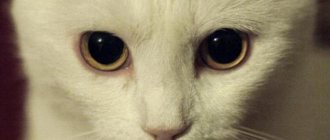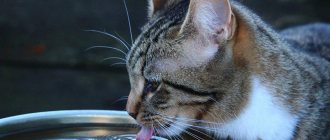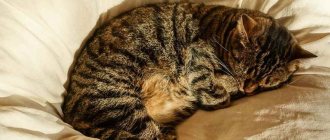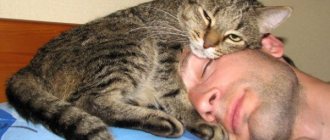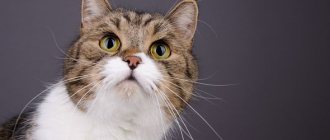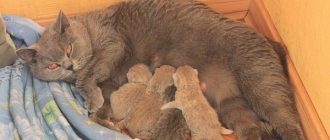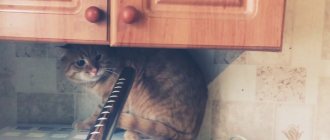No matter how hard a person tries to sleep longer, worries, affairs and responsibilities always interfere with him. But there is little that can distract cats from their dreams: on average, 16 hours a day they cause the envy of their owners, namely, they sleep serenely. If you count, How long do cats sleep? throughout their life, it turns out that they give 70% to sleep, and spend the remaining 30% on getting more tired and going to sleep.
Playing, tracking down prey, mastering new heights on the street or in the apartment - everything uses up a lot of cat energy, which can only be replenished by long and deep sleep.
Why does the cat sleep all day?
Cat owners note that their pets spend a lot of time dozing or sleeping, nestled in a cozy place.
Games and fun often tire them and sleep helps them replenish their strength. But many people worry why cats sleep all the time, considering this behavior to be a deviation from the norm. Most often, there is no reason to worry, since cats are naturally sleepy. A short period of vigor is replaced by deep sleep or a long nap. This is not a malaise at all, as it might seem at first glance, if the cat’s overall appearance is healthy. Alarm bells that accompany drowsiness may include :
- lethargic behavior during the waking period, when favorite games become a burden, apathy, lack of mood and sparkle in the eyes,
- refusal to eat and drink, even your favorite treats,
- dry nose, pale skin, increased body temperature.
These symptoms indicate that your pet is sick and should definitely be seen by a doctor.
If your cat is constantly sleeping
Usually, owners know how much sleep is the daily norm for their cat. When an active pet noticeably loses its vitality and indulges in rest more often than usual, you should take care of its health.
The same applies to increasing the waking phase. This phenomenon may indicate problems with the thyroid gland.
With proper care and suitable conditions, sound and healthy sleep prolongs the animal’s life, allows it to develop harmoniously and delight its owners with its company. If there are problems with the regime, it’s time to show the animal to the veterinarian.
Sleep Features
Cats spend almost two-thirds of the day sleeping, but any deviation in the direction of a significant decrease or increase in hours of sleep should force the owner to take a closer look at the pet. Little kittens can generally sleep almost all the time, interrupting only for food and a short exploration of the world around them. Adults become more active, mobile and spend periods of wakefulness longer and more interesting.
Several factors can influence sleep duration:
- seasonality and weather conditions, in hot weather cats become sleepier,
- age, small kittens and older individuals sleep more,
- how full the pet is, the feeling of satiety always makes you sleepy,
- the atmosphere of the house, the calmer and more comfortable, the more serene the pet rests,
- activity and health.
It is worth noting that overfed cats can sleep more than normal and be less active and mobile than their “slender” counterparts.
Cats cannot sleep continuously. He goes through phases, the first of which is dozing. At this time, processes slow down, but the cat can return from dormancy to wakefulness instantly. If nothing interferes, he falls into a deep sleep. And then complete relaxation sets in, during which it is quite difficult to wake up the pet.
These two phases constantly alternate. At the same time, you still need to leave time for games, entertainment and, of course, delicious food.
Stages
The pet's sleep process is divided into the following stages:
- Nap. The body remains conscious and alert during rest. In the event of an unexpected threat, the animal reacts instantly.
- Shallow sleep. The body rests, but hearing is preserved.
- Deep dream. Muscle tension disappears, short nerve impulses may be observed, due to which the muscles contract and the paws twitch.
- REM phase. The eyes move behind closed eyelids, there is a high probability of dreaming.
The first two stages last about half an hour, followed by 5-7 minutes of a deep phase, which again gives way to sleep. This alternation of stages of sleep allows the animal not to lose vigilance and control the situation around itself at all times.
Long sleep and its causes
There are several reasons for prolonged sleep. If they are not associated with general lethargy and refusal to eat, then they are considered normal.
Cats are naturally very active. It is vital for them to replenish their strength and sleep is the best medicine for this.
Again, returning to natural premises, it should be noted that in nature, cats are predators. Their main diet consists of food rich in proteins. Pets also eat mainly protein foods, which require a long time to digest.
After sterilization, your cat may sleep longer than usual.
Long sleep: normal or pathological?
In general, only a veterinarian can make conclusions about a pet’s health. Perhaps the cat is sick, and sleep is a consequence of malaise, weakness and loss of strength.
A kitten, a small cat sleeps all the time and this is normal. Her sleep may be interrupted by short games and food. At the same time, during rest, he can twitch his paws and squeak quietly. Don't worry, these are signs of emotionality experienced during the day's events.
Experts believe that the number of hours a pet naps and sleeps is greatly influenced by weather conditions . Since thermoregulation is important for animals, in the summer, especially on hot days, the rest period may increase and it will seem that the cat is sleeping all day.
A combination of drowsiness and lack of appetite should alert you. Then you definitely need to take your pet to the vet.
In general, long-term sleep is normal for cats, as long as there are no obvious behavioral abnormalities or problems with appetite or bowel movements during wakefulness.
Options for night and morning activity of cats
It is not only the need for physical activity that encourages cats to get their owners up at night and in the morning. There are other reasons that make a pet behave this way. Often in these ways animals declare:
- inability to control the territory;
- desire to communicate;
- any problems.
For a cat, a house or apartment is its personal territory, which must always be under control. She should have free access to the entire space. The cat periodically walks around the home to make sure that there are no foreign odors and no danger. If the door in one of the rooms is closed, this causes anxiety in the pet; he is not sure of the safety of the territory. There is no need to be surprised that in the middle of the night shouts are heard demanding that the obstacle be removed for inspection.
Cats are smart animals, they understand that a person is a strange, inexplicable creature with whom they need to play a game according to certain rules. At night or early in the morning, the cat wakes up the owner and leads him to the door or refrigerator. The owner, in turn, tries to release or feed the pet, to fulfill its desire, but it refuses. It seems that the animal is behaving stupidly and does not know what it wants. In fact, the cat is just bored, she wants communication, but understands that attention can only be attracted in such ways, and she gets her way.
Your pet's anxiety may be related to illness. If he suddenly wakes you up by meowing, perhaps the cat is in pain and is trying to tell you about his problem. If any signs of illness appear, the animal should be taken to the veterinarian. You should know that cats do not sleep well in a new place; after moving, it will take some time to develop the territory. Owners also experience restless nights when their pet begins to go into heat.
Signs of the disease
An attentive owner will always notice that something is happening to the cat. Lethargy is always a sign of illness, as are the following symptoms :
- the appetite is absent or significantly reduced, the pet may even refuse its favorite treats,
- the nose became dry and hot,
- the cat sleeps all day, apathy has appeared,
- refusal of water,
- increased body temperature,
- there is diarrhea and vomiting,
- the fur has acquired a dull tint, the mucous membranes have turned pale.
Any of these symptoms is a reason to consult a medical specialist. The presence of two or more signs at the same time can be a sign of an acute or chronic disease.
The main reasons why a cat has become lethargic and always sleeps can be diseases such as worms, ticks, poisoning, problems with the intestines or genitourinary tract, as well as injuries of various types. And the sooner the disease is identified, the faster and easier it is to defeat it.
After sterilization
It should be noted that after sterilization surgery, the cat does not eat and sleeps all the time; this is a normal state after anesthesia. If this period lasts for 24 hours, then there is nothing to worry about. If a day has passed and the condition does not change, you need to urgently see a veterinarian.
During the first 24 hours, you don’t need to force the cat to get up or wake him up if she doesn’t want to. Just like insisting on food and drink. Give her a little rest, recover, and she will again delight you with her cheerful appearance.
If the anesthesia has not worn off and the cat is not sleeping, gets up and tries to move around the apartment, do not let it out of sight so that it does not accidentally get injured. It’s better to take her in your arms, calm her down, and maybe she’ll fall asleep. Sleep is the best medicine here.
How long do cats sleep after anesthesia?
The behavior of pets and their condition after surgery always worries worried owners.
If a cat is about to be sterilized, then naturally the owner will be concerned about how much she will sleep after the operation. The body cannot ignore anesthesia, so after it and surgery it will take time to recover. Some creatures recover from anesthesia very quickly and wake up immediately, while others take longer.
If we are talking about a cat, then the question of how long he will sleep after castration also has an answer: it all depends on the individual characteristics of the pet’s body. In any case, he will need the care and attention of his owner. The veterinarian will definitely give important recommendations on this matter.
Why does a cat sleep a lot?
Cat owners are well aware that their pets are big sleepers. At any moment you can find them dozing peacefully in a variety of places. Scientists have calculated that the average cat is quite capable of sleeping up to 22 hours a day. But sleep is not always a sign of calm and well-being. In some situations, excessive sleepiness may indicate illness, or be a sign of an imbalance in the animal's body.
The origin of the cat's long sleep
Cats are originally nocturnal animals. This is how their distant ancestors were, and this is how modern mustachios-striped animals remain. This quality is especially familiar to residents of rural areas, private houses and summer cottages. Cats living in complete or partial freedom come home only to eat and sleep, preferring to travel or hunt at night.
Domestic cats, who live indoors all their lives, rarely roam around the apartment at night, so they sleep much more than their more free-spirited counterparts. For those, significant daytime sleep is simply necessary, as the body needs to recover and digest the prey. How do domestic fluffies sleep so much and maintain the flexibility of the spine and joints, muscle elasticity with almost complete absence of physical activity - a mystery that has not yet been solved by scientists
Normal sleep duration for an animal
Like human offspring, kittens sleep almost all the time, interrupting only to feed. This is completely normal, because their body is still very weak. In their sleep they grow and become stronger. A slightly older cub sleeps less, but still at least half a day.
An adult cat sleeps about the same amount or a little less/more. It is impossible to give an exact figure, because all animals have a pronounced individuality. Much depends on the character. Some cats are energetic, active, they play a lot and have fun. Others are inert, lethargic, prone to weight gain and much less active than their vigorous counterparts. Most of the time they just sleep.
There is a popular expression: “sleeps like a cat with half an eye.” This is a very apt remark. Unlike humans, who must sleep at least 7-8 hours in a row to restore energy, cats sleep in “short intervals.” On average, they simply doze for most of the time without losing their alertness. As soon as the slightest rustle is heard, the cats immediately wake up.
All sleep in cats is divided into two phases:
- Nap, superficial “slow” sleep – 20-30 minutes.
- Deep, “fast” sleep – 5-7 minutes. At this time, animals, like people, dream. Cat owners are well aware of this, since a sleeping pet can twitch its paws in its sleep, “run” and even meow. All this clearly indicates the presence of dreams.
The duration of sleep can be influenced by various external factors, for example, extreme fatigue, stress, changes in temperature. Physiology also influences the duration of rest. Pregnant cats sleep much more - this is a need for the body experiencing increased stress.
Cat sleep phases
Cats, like other mammals, have two stages of sleep: fast and slow sleep.
The first is characterized by muscle relaxation and increased brain activity. At the same time, movements of the eyeballs are observed. There is a theory that at this time the beast dreams. In the mid-20th century, experiments were carried out, during which it was found that most likely cats dream of hunting, toileting and other everyday activities.
The slow phase is accompanied by complete relaxation of the body. At this time, the animal gains strength.
Natural causes of prolonged sleep in cats
A healthy cat can sleep more in the following cases:
- Extreme fatigue. After a night hunt, active play or prolonged wakefulness, the animal needs to restore strength and expended energy, so it sleeps much more than usual.
- Hot weather. At high temperatures, you have to save energy and water reserves in the body. This is well known to animals native to arid and hot places. The ancestors of cats originally lived in deserts, so they were excellent at maintaining strength in the heat and high dry air. They slept during the day and were more active at night, when there is no sun and the temperature drops significantly. Modern cats use genetic memory and prefer to take a nap during the midday hours, so during the hot season they sleep more than usual.
- Cold winter, rain, snow or low indoor temperature. In this case, purrs also sleep a lot, saving heat and trying to expend less energy. Curling up into a tight ball while sleeping makes it easier to maintain temperature balance in the body tissues. This method allows you to survive the cold and not freeze.
- Pregnancy. During gestation, the cat has to live for three, or even seven or eight. This is a burden on the body, and a natural way to maintain strength is long sleep.
- Use of a number of medications with sedative properties. They affect the nervous system and cause some inhibition, which leads to an increase in sleep duration. Drowsiness goes away on its own as soon as the drug's effect wears off.
- Previous surgery. After surgery and anesthesia, the animal sleeps a lot for two reasons: pain due to the operation and the effects of the anesthetic drug. As you recover, the duration of sleep will decrease to the usual norm.
- Vaccination completed. Vaccinations cause a response in the body that is somewhat similar to a disease. The animal feels weak and lethargic, so it sleeps a lot to recover.
- Castration or sterilization. This is not only severe stress, but also hormonal changes in the cat’s body. While the transition is underway, your pet may be sleepy and lethargic.
- Elderly age. The older the cat, the longer his sleep lasts. This is due to the aging of all organs and tissues, lack of energy and reluctance to move a lot, as in youth. The cause of increased sleep duration may also be various sluggish chronic diseases that weaken the pet.
- Recovery after illness. This is an energy-consuming and difficult period for the cat, so he rests and naps a lot.
- Stress. The reaction to it is first excitation of the nervous system, and then severe depression.
How to put a kitten to bed at night
Healthy and active kittens are often especially active at night. Because of this, the owner cannot get enough sleep due to the noise, and the kitten does not receive the necessary attention from a person who is tired during the day.
To avoid such difficulties, you need to teach the kitten to sleep at the appropriate hour. Animal psychologists recommend the following actions:
- Organization of a daily routine and strict adherence to it. Cats are socialized animals, so they need the attention and love of their owner. If possible, the owner should go to bed and get up at the same time. The cat will be able to get used to this regime, and will tend to fall asleep and wake up with the person.
- Create the same environment every evening. Cats thrive when they live on a consistent schedule. In addition, they remember well certain signs of the environment that accompany various activities of the owner. For example, if a person sleeps with the light turned off, then one must remember to turn it off at night. If the owner turns off the TV before going to bed, then this should always be done. Before going to bed, the environment should always be the same. It is through regularly repeated actions that the cat will begin to learn about the time for sleep.
- Feeding the kitten just before bed. All cats love to sleep after a hearty meal.
- Active games 20-30 minutes before bedtime. Evening games are a great way to burn off excess energy before going to bed. Ideal toys for a kitten would be toys that imitate running mice or flying birds, those that can bounce or dangle, and fishing rod toys. You need to play with the kitten until he gets tired and loses interest in games.
Fun games before bed will help you fall asleep faster
- Daytime entertainment. Kittens get bored sitting alone during the day when their owner goes to work. And if you provide him with toys and entertainment, then he most likely will not need the attention of his owner in the middle of the night.
It should be remembered that kittens need variety; they get tired of constantly playing with the same toy. Therefore, toys need to be changed periodically. It is not necessary to buy new ones, just hide them for a while so that the kitten has time to forget about them.
- Arranging a sleeping area. If the kitten knows that he has his own place to sleep, he will be less inclined to invade his owner's space. Kittens like a soft bed, the proximity of their favorite toys, close proximity to bowls of food and water, and a tray. If you arrange a kitten's sleeping place in accordance with its needs, then this is where it will go to sleep at night.
Before bed, you can hide toys with an attractive aroma and cat treats in various places around the house. Thus, the kitten will be able to search for prey at night, which will imitate its natural behavior in the wild.
It's not a good idea to use catnip to distract your kitten before bed. Many animals become more energetic and playful after consuming catnip, and some may even become aggressive.
If no advice helps train a kitten to sleep at night, this is a reason to be wary. Often, the reluctance to rest at the appropriate time is a way in which the pet tries to communicate that he is not feeling well. Therefore, if there are obvious sleep disturbances, the kitten should be shown to a veterinarian.
He's full and sleeping
Pathological causes of too much sleep
If a cat is sleeping unusually much and is showing some concerning signs, owners should contact their veterinarians. This may indicate an underlying disease.
Attention should be paid to the following additional symptoms:
- fever, fever;
- the animal tries to hide, chooses a dark corner and a hard-to-reach place;
- lack of appetite;
- refusal of water;
- complete ignoring of a favorite treat or toy;
- nausea, vomiting;
- digestive disorders;
- heavy, hoarse breathing, runny nose;
- festering eyes;
- blanching of tissues in the mouth cavity;
- trembling, shaky, uncertain gait;
- meowing, including in sleep;
- acute reaction to touch, even aggression;
- matted, unkempt fur.
These symptoms indicate that sleep is not an increase in rest, but an indicator of serious health problems. The pet must be taken to the veterinarian urgently, because the cause can be either an easily treatable disease or an extremely life-threatening pathology.
Sleep disturbance
Typically, kittens sleep calmly and evenly, so excessive sleepiness or chronic lack of sleep is evidence that the pet is stressed or ill.
Kittens take about 50 breaths per minute. If this indicator is higher in a dream, then it is worth observing to understand the cause of the problem. Perhaps the kitten is emotionally disturbed by what is happening in his dream and the owner has nothing to worry about.
Fear and mistrust of the owner leads to the fact that the kitten sleeps very little. He is simply afraid to fall asleep while someone is awake in the house. This requires taking action, because lack of sleep has a very bad effect on a growing kitten.
A kitten's trembling in its sleep can be caused by several reasons - previously experienced stress, uncomfortable posture, the onset of inflammatory processes and diseases. The owner needs to monitor the pet and contact a veterinarian in time.
To determine the kitten's health status, you can watch its sleep.
What affects how long a cat sleeps?
At first glance, it seems that cats are fast asleep, but in fact they wake up from any rustle. The duration of sleep remains the same as it was in cat ancestors. Wild predatory cats rested after a successful hunt, while the body digested food. Modern breeds live about the same way.
Cat sleep includes 2 phases:
- light nap (dream time is half an hour);
- quick deep sleep.
During a nap, the animal lies on its stomach, tucks its paws, ears up or in a ball position. This state is practically no different from the waking state, but less energy is spent. During the period of dozing, breathing slows down, blood circulation and body temperature decrease. But as soon as the animal senses danger, it will immediately jump up, replacing dormancy with an active state. During deep sleep, they relax, rest, and the immune system actively works.
Why do cats sleep so much?
When cats sleep, they move their ears, paws, and meow - this means that they are dreaming. Mustaches have their own biological clocks that work in accordance with time, climate, environment, and health status.
Satiety
If you watch your pet, you will notice that after a hearty lunch or dinner, he goes to bed. After eating, cats need rest. At rest, food is digested and the animal gains new strength. When the diet contains more protein and meat, the animal sleeps for a long time, peacefully. With insufficient calorie food, the pet has to wake up and eat more often. The kitten sleeps a lot, this is normal, because they wake up only to drink their mother’s milk.
Fatigue
Animals expend a lot of energy during the day. Games and hunting require a lot of energy and stamina. Tired of running around, the cat needs to stock up on energy, so he falls asleep. An older pet gets more tired.
Age
Does the kitten sleep all the time? - That's how it should be. Sleep at their age is 22-23 hours. They wake up to eat. At 1 month, kittens begin to be active, play, and explore the world around them. Sleep is reduced and ranges from 21 to 22 hours. Over time, rest hours decrease. One-year-old cats are more awake and have less time to sleep. On average, pets sleep from 14 to 20 hours, the duration varies from person to person. After 8 years, changes occur, the duration of sleep increases. If the pet is no longer small, then it still sleeps more than 20 hours a day, do not panic.
Breed
The duration of sleep also depends on the breed. How different cat breeds sleep:
- Scottish and British cats are able to fall asleep after eating;
- Abyssinians are an active breed and their representatives love to play with their owner. Everything is determined by the characteristics of temperament. Most of the time they are active;
- Egyptian Mau, Bengal cats are active and sleep 14 hours a day;
- Persian cats are lazy, lethargic, phlegmatic. Most of the time they are drowsy, often dozing;
- Siamese cats are constantly tense and relax for a short time;
- Sphynxes, Devon Rexes - need attention, care and are ready to sleep all day long.
How and where does a cat sleep?
There is an opinion that the position and place in which a cat falls asleep speaks about its mood and attitude towards its owners. You can find the cat lying on its back with its paws comically outstretched.
If a pet sleeps without covering itself and without trying to camouflage itself against the background of surrounding objects, it means that it trusts its neighbors and does not expect a trick or a sudden attack from them.
In this case, it is better not to deceive the cat’s expectations and not to disturb her for no reason. Like any living creature, she needs personal space and peace.
Sleeping next to the owner, especially at night, is also considered a sign of openness and trust. True, such behavior can be interpreted as a desire to warm up.
After a hearty dinner, a domestic cat usually immediately goes to bed. For these purposes, he may choose not the most obvious places. Do not be surprised if the animal considers an empty glass vase, sink or dining table to be its bed. It is unlikely that people will ever find out what really motivates cats that fall asleep in unusual places.
Causes of long sleep
Why do cats sleep a lot? This question is asked by many pet owners. Every cat needs healthy sleep. The duration of sleep can be influenced by many reasons.
After sterilization
If a cat sleeps a lot after sterilization, this is a normal reaction of the body to anesthesia and surgery. The pet can be in a sleepy state for 10 days. If drowsiness persists for more than two weeks, this is a reason to contact a specialist; there may be serious postoperative consequences. Many individuals sleep for 12 hours after anesthesia and are already beginning to be awake. For this reason, after castration, cats sleep so much, waking up for 2-3 hours to drink and eat.
Important! Any operation is a great stress for the body, so long sleep is a restorative function.
Cat after sterilization
Cat activity
The duration of sleep also depends on the activity of the pet. If you play with a cat for a long time, then after playing it will immediately go to sleep to restore energy. You may notice that many cats sleep during the day and are active at night. The kitten constantly sleeps after long games or walks. They, like older individuals, become very tired and require restoration of energy reserves.
And others
The cat sleeps a lot, lethargy is constantly observed, loss of interest, refusal to eat are alarming signs. It may indicate a serious illness in your pet. Lethargy, excessive drowsiness, nervous excitability, signs of malfunction of the thyroid gland. The pet must be shown to a veterinarian. If a cat snores and cannot find a comfortable position, this means there are problems with the respiratory system.
Why do cats sleep a lot in winter and in cloudy, rainy weather? In cold weather, metabolism slows down and cats sleep longer. Before the onset of cold weather, the pet’s body builds up its fat layer in preparation for the cold, and the metabolism slows down. As daylight hours decrease, they become lazy and calm, sleep and eat more. In the summer, on hot days, cats love to soak up the sun and sleep. After sleeping during the day, cats become active at night.
Important! Why do pregnant cats sleep so much? Because carrying a fetus takes a lot of energy, activity decreases, and frequent rest is needed.
Pregnant cat sleep

